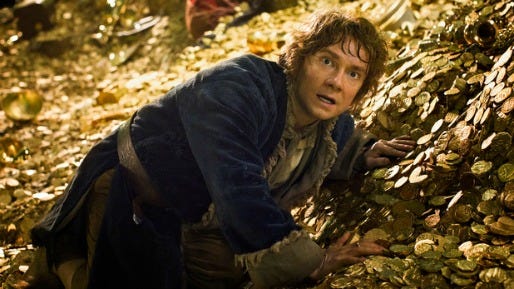The Hobbit: The Desolation of Smaug

The sort of people who slavishly read fantasy novels in general, and the works of J.R.R. Tolkien in particular (like me), also tend to be the sort who play video games, especially the role-playing variety. (Again, me.) These overlapping constituencies are no doubt familiar with the concept of the expansion pack.
This is when the creators of a successful game issue a supplement that keeps the basic architecture in place, and just adds new elements — extended storylines, new characters, new monsters, fresh hardware and so on. There isn't nearly as much work involved in churning out an expansion pack as an original game, so they tend to be handsome for game-makers.
In blowing up Tolkien's modest novel "The Hobbit" — 287 pages in my ancient Ballantine paperback edition — into a trio of movies tipping near three hours each, director Peter Jackson and his cohorts have essentially applied the M.O. of the expansion pack to moviemaking.
Oh, Tolkien's delightful children's story is still there, about an unassuming hobbit named Bilbo Baggins (Martin Freeman) who gets recruited to accompany 13 dwarves and a wizard on a journey to faraway lands to slay a dragon and win back a stolen kingdom. But it's been "augmented" to such a ridiculous degree that keepers of the original flame might have a hard time recognizing the quaint little tale they remember so fondly.
I still liked the final product, which is a rip-roaring, action-packed good time, because, as I said, this sword-and-sorcery stuff is totally in my wheelhouse. But in giving it the grand, elongated "The Lord of the Rings" treatment, I fear casual fans may feel Tolkien's tender prequel has been burgled of much of its charm.
At the outset of the second film of the triplet, "The Hobbit: The Desolation of Smaug," Bilbo, dwarf leader Thorin Oakenshield (Richard Armitage), sage wizard Gandalf (Ian McKellen) and their companions have successfully crossed through the Misty Mountains and escaped the clutches of a horde of goblins and orcs who want their heads.
They still have a long way to go to reach Erebor, the lonely peak where the eponymous dragon lies sleeping under a mountain of treasure. To get there, Bilbo & Co. must brave the suffocating Mirkwood Forest, battle giant spiders and encounter some woodland elves who aren't so sprightly in their attitudes toward dwarves.
For me, this section contains some of the most rapturous portions of Tolkien's novel, as the wayward adventurers are forced to navigate both treacherous terrain and tricky political/racial territory. For some reason, though, Jackson and his co-screenwriters (Fran Walsh, Philippa Boyens and Guillermo del Toro) decided this is precisely they area where they must economize the story down to bare bones.
Thus, the party's encounter with fearsome "skin-changer" Beorn (Mikael Persbrandt) is over almost before it begins. Likewise, the claustrophobic taint of the Mirkwood isn't allowed time to settle in. And Bilbo's comedic-yet-scary rescue of his compatriots at the hands of the spiders, employing his new magic invisibility ring, stinging sword and a bit of clever poetry, doesn't summon up the scares or the laughs it ought to.
Instead, we're treated to a whole bunch of byplay involving elven king's son Legolas (Orlando Bloom), brought back from the "LOtR" movies for another go-round, and Tauriel (Evangeline Lilly), a badass warrior elf woman who's completely invented out of whole cloth. We also get to know a lot more about the internal power struggles of Laketown and its would-be hero, Bard (Luke Evans), than is really necessary, plus an expanded look at Gandalf's investigation of a mysterious Necromancer down south and, most bizarrely, the stirring of an interracial romance 'twixt elf and dwarf. Yes, really. The way Jackson and the gang are building this thing up, I think we're in store for the full Romeo/Juliet entanglement in the third installment.
I couldn't help noticing that nearly every time the film deviates significantly from the book, it's to diminish Bilbo as a character. Instead of being the center of the action and the doer of deeds, he becomes merely the person who sets in motion events of which others take full advantage.
So for example, instead of singlehandedly rescuing the dwarves from their elvish captors using empty wine barrels, he's a bit player in a big action set-piece starring Legolas and Tauriel, and rather than being the one who notices the not-so-proverbial chink in the armor of the mighty Smaug (captivatingly voiced by Benedict Cumberbatch), he merely confirms what others have told him.
I still enjoyed the second "Hobbit" film. But in piling on so much extraneous other stuff, we feel less like we're watching a movie than playing it on our game console. Consequently, it's less consequential.
4 Yaps



